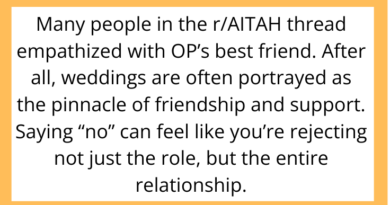AITAH for Not Inviting My Dad’s New Wife to My Graduation?
Graduations are supposed to be a celebration of years of hard work, but for many families, they become battlegrounds of old wounds and new resentments. This was exactly the case for one Reddit user who turned to the r/AITAH community to ask: Was it wrong to exclude their father’s new wife from their big day? Let’s dive into the full story, examine the perspectives, and see what the internet thinks about whether this decision made them a jerk—or just protective of their peace.
The Background: A Fractured Family Tree

The Original Poster (OP) explained that their parents divorced when they were 12. The split wasn’t amicable: OP’s father had been unfaithful, and his affair ultimately led to him marrying the woman he cheated with. While OP tried to stay civil over the years, they never really accepted the new stepmother, whom they felt had contributed to the breakdown of their family.
Despite the tension, OP maintained occasional contact with their father, mostly out of respect. But their relationship was never fully repaired, and OP still held resentment for how the divorce played out.
The Invitation List: Drawing the Line

Fast forward to graduation. OP decided to keep the celebration small—just a few close friends, their mom, siblings, and maternal grandparents. When their dad asked if he could attend with his wife, OP hesitated. In the end, they told their dad he was welcome but preferred his wife not to come.
The father was offended, insisting that as his spouse, she had the right to be there. OP countered that this was a personal milestone, and they didn’t want to feel uncomfortable on a day they had worked so hard for.
According to OP, this conversation spiraled into a heated argument, with their dad accusing them of being disrespectful and immature. The rest of the family quickly took sides, fueling the fire even more.
The Fallout: Family Divided

After OP stood firm, their dad chose not to attend the ceremony at all. He sent a curt message saying he hoped OP would “grow up someday.” The stepmother later posted vague social media updates about “people who can’t move on” and “bitterness poisoning families.”
Some extended relatives also chimed in, telling OP they should have “just sucked it up” for one day. Others applauded OP for honoring their own feelings instead of forcing themselves to play happy family.
Why This Struck a Nerve: The AITAH Debate

Graduation milestones often come loaded with family baggage. Many commenters empathized with OP, saying that no one should have to accommodate people who hurt them. Others felt that by excluding their father’s wife, OP was punishing him and refusing to move forward.
Let’s look closer at the issues at play.
The Case for Excluding the Step-Mom
1. Emotional Well-Being Comes First
Graduation is about the graduate—not about preserving other people’s feelings. If someone’s presence will overshadow your joy, you have every right to set boundaries.
2. No Obligation to Perform Forgiveness
Many people assume that simply because years have passed, old wounds must be healed. But forgiveness can’t be forced, and pretending everything is fine just for appearances often backfires.
3. Respect for Boundaries
OP clearly communicated their preference: The father was invited, but the stepmother was not. While this might be hurtful, it was honest—and everyone had the chance to decide whether they would still attend.
The Case Against Exclusion

1. Prolonging Family Tension
Critics argued that this decision would deepen the rift and possibly make reconciliation harder in the long run.
2. Public Perception
Others pointed out that family milestones often involve extended relatives and friends, and excluding the stepmother could look petty or vindictive, regardless of whether it felt justified.
What the Community Decided
The r/AITAH community leaned strongly in OP’s favor. The top comment read:
“You’re not obligated to pretend someone who hurt your family deserves to be there on your special day. Your dad chose to make it an ultimatum instead of respecting your feelings.”
However, some also suggested OP could consider inviting the stepmother to future events if they ever felt ready—just not at this milestone that held so much emotional weight.
How to Handle Similar Situations
If you’re grappling with a comparable dilemma, here are a few tips:
Be Clear and Direct
Let your family know exactly what you’re comfortable with—and why. You’re more likely to be respected if you stand firm without being cruel.
Prepare for Pushback
Even reasonable boundaries can upset people. That doesn’t mean you’re wrong.
Prioritize Your Own Joy
Milestones like graduations don’t come often. You deserve to look back on them with fondness, not regret.
Conclusion: Are You the Jerk?

After reading hundreds of responses, it’s clear: Setting limits about who gets to share your achievements doesn’t automatically make you a jerk. It means you’re protecting the experience you worked so hard for.
In the end, this isn’t about revenge or pettiness. It’s about choosing peace, honesty, and self-respect—even if that disappoints people who wish the past could be swept under the rug.



